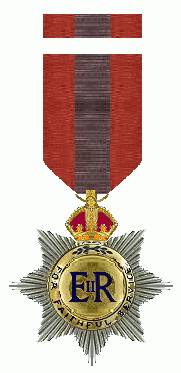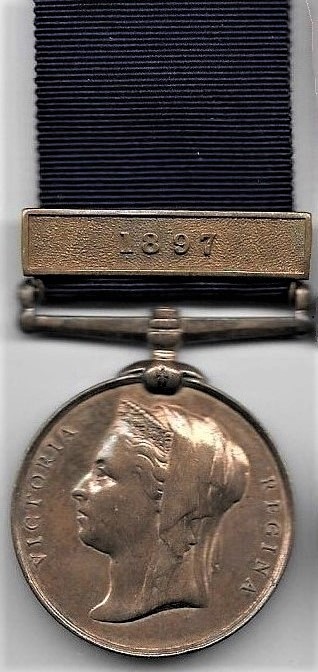
A medal or medallion is a small portable artistic object, a thin disc, normally of metal, carrying a design, usually on both sides. They typically have a commemorative purpose of some kind, and many are presented as awards. They may be intended to be worn, suspended from clothing or jewellery in some way, although this has not always been the case. They may be struck like a coin by dies or die-cast in a mould.

The Imperial Service Order was established by King Edward VII in August 1902. It was awarded on retirement to the administration and clerical staff of the Civil Service throughout the British Empire for long and meritorious service. Normally a person must have served for 25 years to become eligible, but this might be shortened to 16 years for those serving in unhealthy climates abroad. There is one class: Companion. Both men and women are eligible, and recipients of this order are entitled to use the post-nominal letters 'ISO'.

The King's Police Medal (KPM) is awarded to police in the United Kingdom for gallantry or distinguished service. It was also formerly awarded within the wider British Empire, including Commonwealth countries, most of which now have their own honours systems. The medal was established on 7 July 1909, initially inspired by the need to recognise the gallantry of the police officers involved in the Tottenham Outrage. Renamed the King's Police and Fire Services Medal (KPFSM) in 1940, it was replaced on 19 May 1954 by the Queen's Police Medal (QPM), when a separate Queen's Fire Service Medal was also instituted. The current award was renamed the King's Police Medal following the death of Queen Elizabeth II in 2022 and the accession of King Charles III to the throne of the United Kingdom.
The Royal Victorian Medal (RVM) is a decoration established by Queen Victoria in April 1896. A part of the Royal Victorian Order, it is a reward for personal service to the Sovereign or the royal family, and is the personal gift of the Sovereign. It differs from other grades of the order in appearance and in the way it is worn.

The King Edward VII Coronation Medal was a commemorative medal issued in 1902 to celebrate the coronation of King Edward VII and Queen Alexandra.

The King George V Coronation Medal was a commemorative medal instituted in 1911 to celebrate the coronation of King George V, that took place on 22 June 1911.
The King George VI Coronation Medal was a commemorative medal, instituted to celebrate the coronation of King George VI and Queen Elizabeth.
The Overseas Territories Police Medal (OTPM), known as the Colonial Police Medal (CPM) until April 2012, is a medal awarded for gallantry or distinguished service to all ranks of police forces and organised fire brigades in British Overseas Territories, and formerly in Crown Colonies and British Dependent Territories. Police officers in these areas can also be awarded the higher ranking King's Police Medal. The CPM was first awarded in 1938.

The Africa General Service Medal, established in 1902, was a campaign medal of the United Kingdom. It was awarded for minor campaigns that took place in tropical Africa between 1900 and 1956, with a total of forty five clasps issued. The medal is never seen without a clasp and some are very rare. Most medals were granted to British Colonial Auxiliary Forces units, including the King's African Rifles and the West African Frontier Force. The only campaigns where European personnel were present in any numbers were the various Somaliland campaigns,, and in Kenya.

The Diamond Jubilee Medal was instituted in 1897 by Royal Warrant as a British decoration. The medal was awarded to members of the Royal Family and the court, guests and dignitaries present at the celebrations of the Diamond Jubilee of Queen Victoria and to selected soldiers and sailors who formed the jubilee parade in London.

The Golden Jubilee Medal was instituted in 1887 by Royal Warrant as a British decoration to be awarded to participants of Queen Victoria's golden jubilee celebrations.

Delhi Durbar Medals were instituted by the United Kingdom to commemorate the Delhi Durbar where the new Emperor of India was proclaimed, in 1903 for Edward VII, and in 1911 for George V. On both occasions the medals were one and a half inches in diameter and were awarded in both gold and silver. They were worn in date order alongside Coronation and Jubilee medals on the left chest, suspended from a ribbon one and a quarter inches wide. These Royal commemorative medals were worn before campaign medals until November 1918, after which the order of wear was changed, with them now worn after campaign medals and before long service awards.

The Police Coronation Medal was sanctioned in 1911 as an award to policemen, members of ambulance units, firemen and Royal Parks' staff on duty during the official celebrations of the coronation of King George V that took place during 1911.

A Police Jubilee Medal was awarded to those on duty at Queen Victoria's Golden and Diamond Jubilee celebrations.

Queen Victoria's Commemoration Medal 1900 (Ireland), more commonly referred to as the Visit to Ireland Medal 1900, was awarded to those members of the Irish Police Forces on duty at Queen Victoria’s various engagements during her visit to Ireland in 1900.

King Edward VII’s Visit Commemoration Medal 1903 (Ireland), more commonly referred to as the Visit to Ireland Medal 1903, was awarded to those members of the Irish Police Forces on duty during the various engagements of King Edward VII’s visit to Ireland in 1903. A total of 7,756 medals were awarded.

King George V's Visit Police Commemoration Medal 1911 (Ireland), more commonly referred to as the Visit to Ireland Medal 1911, was awarded to those members of the Irish Police Forces on duty during the various engagements of King George V's visit to Ireland in 1911.
A number of awards have been established by the Royal National Lifeboat Institution (RNLI) since its creation in 1824. None are approved by the Crown, and are therefore unofficial awards. As such, they do not appear in the official British order of wear, although the principal lifesaving award, the Medal of the RNLI, can be worn on the right breast in uniform by members of the British armed forces.

The Mauritius Police Long Service and Good Conduct Medal was awarded by the Dominion of Mauritius between 1968 and 1992 to members of the Mauritius Police who completed eighteen years service.

The Mauritius Fire Services Long Service and Good Conduct Medal was awarded between 1968 and 1992 by the Dominion of Mauritius to members of local fire services.















